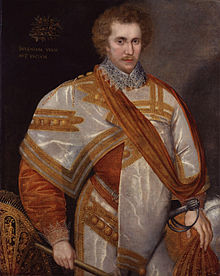mandilion
Appearance
English
[edit]
Etymology 1
[edit]From Middle French mandillon (from 1572), from mandille + -on (“forming diminutives of things”); compare Italian mandiglione (1598).[1]
Pronunciation
[edit]- (Received Pronunciation) IPA(key): /mɑnˈdɪlɪən/
Audio (Southern England): (file)
- (General American) IPA(key): /mænˈdɪli.ən/, /-jən/
- Homophone: mandylion
- Rhymes: -ɪljən
- Hyphenation: man‧di‧li‧on
Noun
[edit]mandilion (plural mandilions)
- A loose outer garment resembling a cassock or coat, often sleeveless, worn by soldiers over armour or by menservants as a type of overcoat.
- 1609, T. Deckar (Thomas Dekker), The Guls Horne-booke, London: Imprinted at London [by Nicholas Okes] for R. S[ergier?]; republished as T. Decker; J[ohn] N[ott], The Gull's Hornbook: Stultorum plena sunt omnia. Al savio mezza parola basta, Bristol: Reprinted for J. M. Gutch and sold in London by R. Baldwin, and R. Triphook, 1812, OCLC 921008261, pages 68–69:
- You see likewise, that the lion, being the king of beasts; the horse, being the lustiest creature; the unicorn, whose horn is worth half a city; all these go with no more clothes on their backs, than what nature hath bestowed upon them: but your baboons, and your jackanapes, being the scum and rascality of all the hedge-creepers, they go in jerkins and mandilions.
- 1801, T[homas] Roberts with W[illiam] W[ood], The English Bowman, or Tracts on Archery: To which is Added the Second Part of the Bowman's Glory [by William Wood], London: Printed for the author, by C. Roworth, Hudson's Court, Strand [...], →OCLC, page 267:
- [T]hen followed the younger men of their train, and for the moſt apparelled in ſatin doublets, ſilk hats, chains of gold about their bodies, and ſilk hoſe, with a bow and four ſhafts, and every one had his Page going before him in red mandilions, as before mentioned, and caps accordingly ſuitable, […] and every one of theſe Pages had upon their mandilions theſe ſentences written both before and behind; / Honeſt labour procureth health, / By honeſt labour men come to wealth.
- 1810, William Duane, A Military Dictionary, or, Explanation of the Several Systems of Discipline of Different Kinds of Troops, Infantry, Artillery, and Cavalry; the Principles of Fortification, and All the Modern Improvements in the Science of Tactics: Comprising The Pocket Gunner, or Little Bombardier; the Military Regulations of the United States; the Weights, Measures, and Monies of All Nations; the Technical Terms and Phrases of the Art of War in the French Language. Particularly Adapted to the Use of the Military Institutions of the United States, Philadelphia, Pa.: Printed and published by William Duane, No. 98, Market Street, →OCLC, page 362:
- MANDILION, (Mandille, Fr.) the soldier's coat is so called by the Italians. It does not, however, bear that meaning either amongst us or among the French; Mandilion and Mandille signifying a footman's great coat.
- 1875, Homer, “The Tenth Book of Homer's Iliads”, in George Chapman, transl., edited by Richard Herne Shepherd, The Works of George Chapman: Homer's Iliad and Odyssey, London: Chatto and Windus, Piccadilly, →OCLC, page 123:
- Thus put he on his arming truss, fair shoes upon his feet, / About him a mandilion, that did with buttons meet, / Of purple, large and full of folds, curl'd with a warmful nap, / A garment that 'gainst cold in nights did soldiers use to wrap; […]
- 1978, Doreen Yarwood, Illustrated Encyclopedia of World Costume, London: B. T. Batsford, →ISBN, page 279:
- Mandilion A loose coat or jacket reaching to the hips and worn with the sleeves hanging free. Designs in the later Middle Ages resembled a tabard […] in being put on over the head and could be sleeveless; they were chiefly worn by soldiers and ordinary people. In the second half of the sixteenth century the mandilion was more a fashionable garment, when it was buttoned at the neck, its sleeves hanging behind the arm. Like the Spanish capes of the day it could be turned partly askew, in which case one sleeve hung down in front and the other down the back. This was then referred to as wearing it Colley-Westonward, meaning awry.
- 1609, T. Deckar (Thomas Dekker), The Guls Horne-booke, London: Imprinted at London [by Nicholas Okes] for R. S[ergier?]; republished as T. Decker; J[ohn] N[ott], The Gull's Hornbook: Stultorum plena sunt omnia. Al savio mezza parola basta, Bristol: Reprinted for J. M. Gutch and sold in London by R. Baldwin, and R. Triphook, 1812, OCLC 921008261, pages 68–69:
Quotations
[edit]- For more quotations using this term, see Citations:mandilion.
See also
[edit]Etymology 2
[edit]See mandylion.
Noun
[edit]mandilion (plural mandilions)
- Alternative form of mandylion.
References
[edit]- ^ John Florio (1598) A VVorlde of Wordes, or Most Copious, and Exact Dictionarie in Italian and English, Collected by Iohn Florio, London: Printed at London by Arnold Hatfield for Edw[ard] Blount, →OCLC.
Categories:
- English terms derived from Middle French
- English 3-syllable words
- English terms with IPA pronunciation
- English terms with audio pronunciation
- English 4-syllable words
- English terms with homophones
- Rhymes:English/ɪljən
- Rhymes:English/ɪljən/4 syllables
- English lemmas
- English nouns
- English countable nouns
- English terms with quotations

